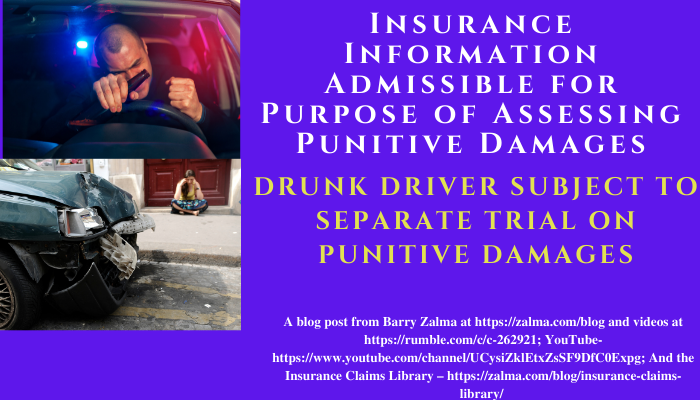-
News Feed
- EXPLORE
-
Pages
-
Groups
-
Events
-
Blogs
-
Marketplace
-
Offers
-
Jobs
-
Developers
Insurance Information Available to Prove Net Worth of Defendant

Drunk Driver Subject to Separate Trial on Punitive Damages
Read the full article at https://www.linkedin.com/pulse/insurance-information-admissible-purpose-assessing-zalma-esq-cfe and at https://zalma.com/blog plus more than 3950 posts.
Antarctic Mechanical Services, Inc. (AMS) and Phillip Bertellotti moved the USDC for Clarification and Reconsideration of its Order Dated August 26, 2020. In Tracey James v. Antarctic Mechanical Services, Inc., et al. No. 3:18-CV-678, United States District Court, S.D. Mississippi, Northern Division (October 27, 2021) the parties sought reconsideration of motions dealing with evidence needed to determine appropriate damages.
Factual History
This case arose out of a car accident in which plaintiff Tracey James was rear-ended by defendant Phillip Bertellotti. Bertellotti was driving a company truck belonging to his employer, AMS. At the time of the accident, Bertellotti allegedly was intoxicated. He has admitted simple negligence in causing the crash.
Request for a Phased Trial
The motion for a phased trial is consistent with Federal Rule of Civil Procedure 42(b).
Request to Exclude Reference to Alcohol Consumption During Liability/Compensatory Phase
In defendants’ motion in limine, they asked the Court to exclude any references or arguments to the jury regarding punitive damages during plaintiff’s case in chief. Because Bertellotti has already admitted to simple negligence they claim liability is not contested, and the issue of intoxication is relevant only during the punitive damages phase.
The misdemeanor DUI charge and consumption of alcohol prior to the accident, intoxication is relevant during the liability phase. James is pursuing a gross negligence claim against Bertellotti. The consumption of alcohol may be central to whether Bertellotti was grossly negligent on that day. Evidence regarding Bertelloti’s use of alcohol is relevant to assessing Bertelloti’s credibility. The statute establishes that net worth is considered-not that it is solely considered-in determining the amount of punitive damages and it is used to calculate the statutory cap for punitive damages.
The trial court is tasked with scrutinizing any punitive damages award.
Analysis
The use of “net worth,” “financial condition,” and “any other circumstances,” collectively, envision the fact-finder being presented with robust evidence, including liability insurance, to determine the defendant’s financial ability to pay the award.
ZALMA OPINION
If the plaintiff proves that Bertelloti’s conduct was so wrongful that punitive damages may be assessed it might be a Pyrrhic victory since it might cause the insurance company to refuse to pay compensatory damages as well as punitive damages. A liability policy is an asset – but only if it provides coverage to protect its insured.
I will be taking a short break from publishing my blog but I will be back.
© 2021 – Barry Zalma
We are 100% funded for October.
Thanks to everyone who helped out. 🥰
Xephula monthly operating expenses for 2024 - Server: $143/month - Backup Software: $6/month - Object Storage: $6/month - SMTP Service: $10/month - Stripe Processing Fees: ~$10/month - Total: $175/month
- Art
- Causes
- Crafts
- Crime
- Dance
- Drinks
- Film
- Finance
- Fitness
- Food
- Games
- Gardening
- Health
- Home
- Literature
- Music
- Networking
- Paranormal
- Other
- Politics
- History
- News
- Party
- Science
- Religion
- Shopping
- Sports
- SyFy
- Politically Incorrect
- Philosophy
- Theater
- Technology
- Wellness



